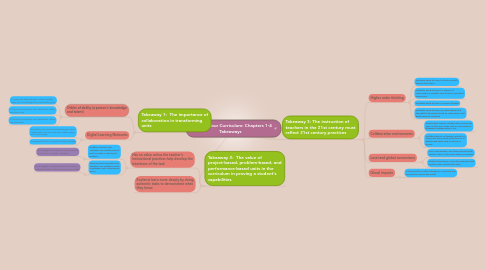
1. Takeaway 1: The importance of collaboration in transforming units
1.1. Orbits of ability (a person's knowledge and talent)
1.1.1. Moving into other people's orbit of ability helps your knowledge and capabilities grow.
1.1.2. All teachers have their own orbits that others can learn from.
1.1.3. All teachers have their own orbits that others can learn from
1.2. Digital Learning Networks
1.2.1. Educators can use social networking tools to collaborate such as Facebook, Twitter, Diigo, and ASCD EDge.
1.2.2. Increases teachers' access to orbits of ability
2. Takeaway 2: The value of project-based, problem-based, and performance-based units in the curriculum in proving a student's capabilities
2.1. Has no value unless the teacher's instructional practices help develop the intentions of the task
2.1.1. Problem-Solving Unit: Students can collaboratively work to solve a real-world problem
2.1.1.1. work together to reach a research-based solution for a specific audience
2.1.2. Phenomenon-oriented Unit: Students can collaboratively investigate why phenomena occur
2.1.2.1. work together to decide what information is relevant based on the unit's purpose or task
2.2. Students learn more deeply by doing authentic tasks to demonstrate what they know
3. Takeaway 3: The instruction of teachers in the 21st century must reflect 21st century practices
3.1. Higher order thinking
3.1.1. Students need to learn to think critically about information
3.1.2. Students need to learn to discern if information is credible and what it's intended meaning is
3.1.3. Students need to learn to reason fluently
3.1.4. Students need to learn to make logical and thoughtful decisions based on information that gathered and analyzed
3.2. Collaborative environments
3.2.1. Twenty-first century collaborative groupings now include new roles such as interviewers, bloggers, videographers, etc.
3.2.2. Collaboration is no longer limited to a classroom's four walls with the use of web-based tools such as Skype or ooVoo
3.3. Local and global connections
3.3.1. Local connections- one class interacts with another class in the same state or province
3.3.2. Global connections- one class interacts with another class outside the state
3.4. Glocal impacts
3.4.1. Acting locally to effect change in a positive way somewhere else in the world
